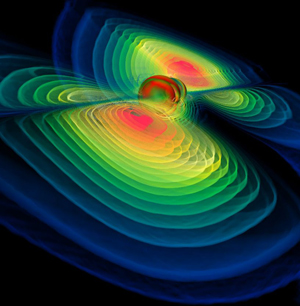Astronomy is the ultimate “seeing” science. Unlike our experience of everyday reality, there’s no sound out in the cosmos, so the processes and events that we observe in the universe unfold before us like a silent movie.

Good vibrations. Gravity waves offer a entirely new way to perceive events such as the collisions of black holes.
W. Benger, Zuse Institute Berlin/Max-Planck Institute for Gravitational Physics
Now some researchers are trying to add a soundtrack to that movie. They are the ones searching for gravitational waves — ripples in space-time caused by the rapid motion of massive objects. If detected, these waves will offer an entirely new way to perceive the universe — one that has more in common with hearing than seeing.
In Episode #11 of The Universe in Mind podcast, we hear from Neil Cornish (Montana State University, Bozeman) about recent progress in the hunt for gravitational waves, and we get a bold prediction for how soon these elusive but revealing signals will be detected.
Jacqueline Radigan of the University of Toronto also drops by to explain how brown dwarfs — objects that are midway between stars and planets — can have their own weather patterns
Enjoy the program!
Ivan Semeniuk is host of the podcast The Universe in Mind and a science journalist in residence at the Dunlap Institute for Astronomy and Astrophysics, University of Toronto.
 0
0
Comments
You must be logged in to post a comment.